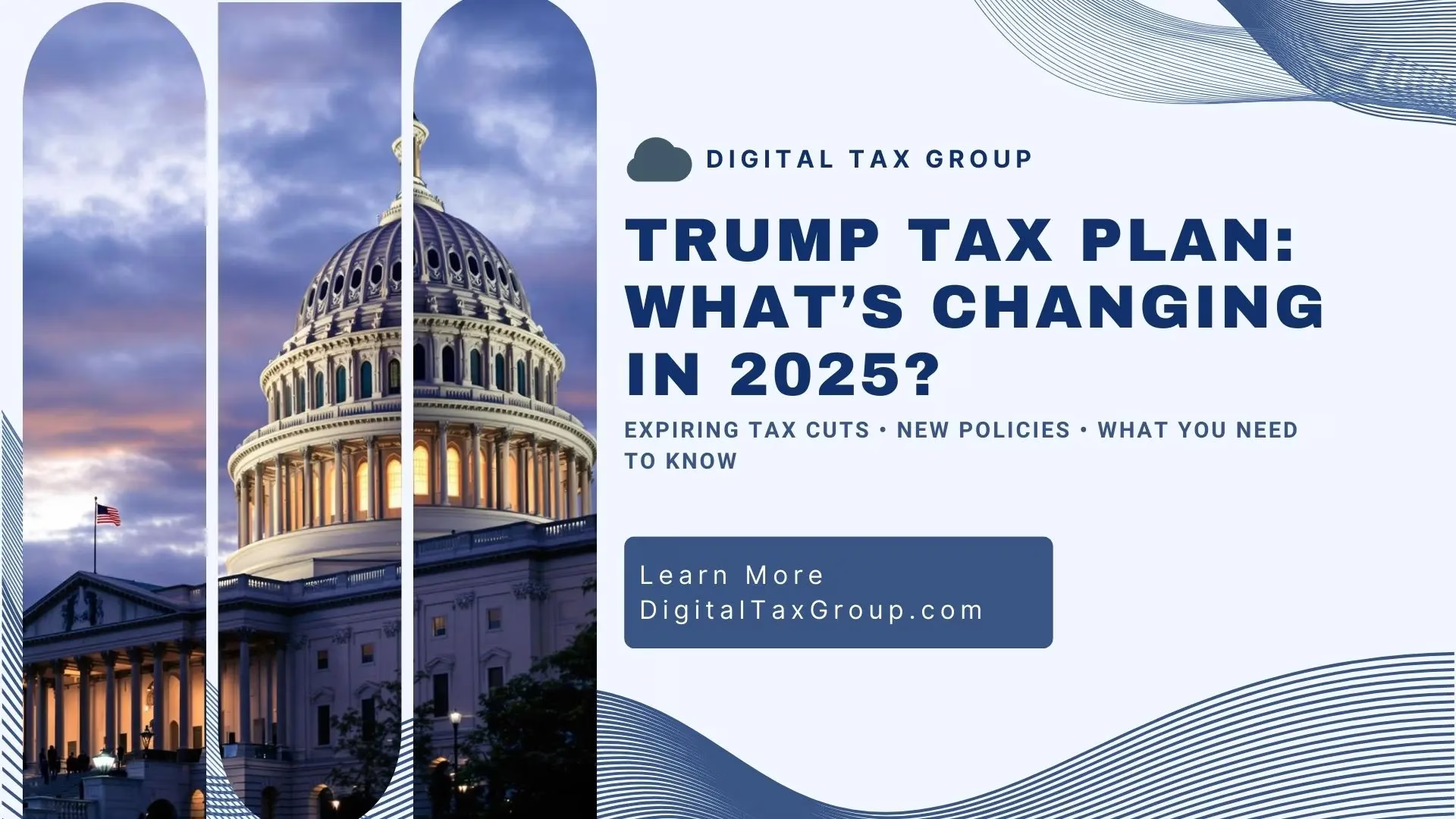The Trump Tax Plan has been a defining piece of tax policy in recent years, shaping how individuals and businesses handle their finances. With the 2017 Tax Cuts and Jobs Act set to expire in 2025, many Americans wonder what the future holds. Will the Trump administration’s tax cuts be extended? Will new policies bring higher taxes or additional relief? Understanding these potential changes is crucial for financial planning and tax strategy.

The Foundation of the Trump Tax Plan
The 2017 Tax Cuts and Jobs Act: A Look Back
Signed into law by President Donald Trump in December 2017, the Tax Cuts and Jobs Act (TCJA) introduced some of the most significant changes to the U.S. tax system in decades. Key provisions included:
- A reduction in the corporate tax rate from 35% to 21%
- Adjustments to individual tax brackets and marginal rates
- A near-doubling of the standard deduction
- An increase in the child tax credit
- A higher exemption threshold for the estate tax
- Limits on the state and local tax (SALT) deduction
These changes had widespread effects, influencing business investment, individual tax burdens, and federal revenue. However, most provisions affecting individuals were temporary and are set to expire after the 2025 tax year unless Congress takes action.
Tax Policies Under the Trump Administration
The Trump administration framed its tax reform as a way to stimulate economic growth, create jobs, and increase wages. Proponents argued that lowering the corporate tax rate made U.S. businesses more competitive globally, while adjustments to the individual tax brackets put more money in taxpayers’ pockets.
However, critics claimed that the Trump tax law was skewed toward benefiting corporations and high-income earners. According to the Tax Policy Center, the highest-income households received the largest percentage of tax cuts, while middle-class and lower-income taxpayers saw more modest benefits.
Additionally, despite promises that the tax cuts would pay for themselves through increased economic activity, the national deficit continued to grow. The debate over the Trump tax cuts remains central to discussions about what should happen in 2025.
The 2025 Expiration: What Happens Next?
Individual Tax Cuts Set to Expire
Many of the individual tax cuts introduced in the 2017 Tax Cuts and Jobs Act are set to expire after 2025. This means that unless extended, taxpayers could see:
- A return to higher individual income tax rates
- A reduction in the standard deduction
- A lower child tax credit
- The reintroduction of certain tax exemptions

These changes could significantly impact tax bills for millions of Americans. To prepare for potential tax increases, individuals should consider proactive tax planning. Consulting with experts, such as Ian Borbolla, Principal CPA at Digital Tax Group in Miami, FL, can help navigate these complex changes.
For tailored tax strategies, schedule an appointment with a tax professional today.
Corporate and Business Tax Implications
The Future of the Corporate Tax Rate
One of the most significant elements of the Trump tax plan was reducing the corporate tax rate from 35% to 21% under the 2017 Tax Cuts and Jobs Act. This tax cut was designed to make the U.S. more competitive internationally and encourage business investment. However, with the potential expiration of the Trump tax cuts, corporations may face a tax increase if the rate returns to pre-2017 levels.
Several economic analysts predict that increasing the corporate tax rate could affect:
- Business investment – Higher taxes may lead to reduced capital expenditures and hiring.
- Corporate income tax revenue – A higher tax rate could generate more tax revenue but might also discourage growth.
- Stock market performance – Investors could see a decline in corporate earnings, impacting shareholder value.
If new policies reinstate higher business tax rates, companies may need to reconsider tax strategies and deductions. Business owners can explore financial planning options with tax professionals at Digital Tax Group to minimize their tax burdens.
Impact on Small Businesses and Pass-Through Entities
The Trump tax law also introduced tax benefits for small businesses and pass-through entities, such as S corporations, sole proprietorships, and partnerships. A key provision was the 20% deduction for qualified business income (QBI), which provided substantial relief to business owners. However, this deduction is also set to expire in 2025, raising concerns for entrepreneurs.
Potential changes include:
| Tax Provision | 2017-2025 Policy | Expected Change in 2025 |
|---|---|---|
| Corporate Tax Rate | 21% | May increase to 28% or higher |
| Pass-Through Deduction | 20% QBI Deduction | Likely to expire |
| Business Interest Deduction | Limited | May become more restrictive |
| Bonus Depreciation | 100% Expensing | Phasing out gradually |
With these potential changes, businesses should reassess their tax planning strategies to maximize benefits before 2025 tax changes take effect. Those looking for expert guidance can schedule a consultation for tax planning assistance.
Will There Be a New Tax Plan for Businesses?
As Donald Trump returns to office, he has signaled interest in extending or expanding his original tax policies. A new tax plan could focus on:
- Extending corporate tax cuts to maintain business competitiveness
- Reducing capital gains tax rates to encourage investment
- Revising tax brackets for business income

However, political opposition and economic concerns could shape the final version of any future tax bill. Business owners should stay informed about legislative developments to prepare for upcoming changes.
For more details on tax strategies, bookkeeping, and financial planning, visit the Digital Tax Group services page.
Analyzing the Trump Tax Plan’s Economic Impact
The Effects of the 2017 Tax Cuts
The 2017 Tax Cuts and Jobs Act significantly reshaped the U.S. tax system, with proponents arguing it boosted the economy and critics claiming it primarily benefited corporations and high-income earners. According to the Tax Policy Center, the tax cuts contributed to short-term GDP growth, but the long-term impact remains debated.
Some key economic effects included:
- Business expansion – Lowering the corporate tax rate to 21% incentivized companies to invest in growth.
- Stock market surge – Many corporations used their tax savings for stock buybacks, boosting shareholder returns.
- Increased federal deficit – Despite expectations that economic growth would offset revenue losses, the 2017 tax act will increase the national debt by an estimated $1.5 trillion over a decade.
According to forecasts from the Tax Foundation, the enactment of the tax cuts resulted in a short-term economic boost, but concerns remain over the long-term sustainability of the deficit.

Fact-Checking Trump’s Claims on Tax Cuts
During his presidency, Donald Trump frequently promoted the benefits of his tax policies, claiming they led to wage increases, job growth, and economic prosperity. At Trump’s tax speech in Indianapolis, he stated:
“These massive tax cuts will be rocket fuel for the American economy.”
While the economy did experience growth following the 2017 tax act, external factors such as global trade and monetary policy also played a role. A deeper analysis by the Tax Policy Center suggests that while corporate profits soared, wage growth remained moderate.
For individuals and businesses preparing for potential tax changes, consulting a professional is crucial. Contact Digital Tax Group for expert tax planning and financial strategy guidance.
Preparing for Potential Tax Changes
How Businesses and Individuals Can Adapt
With the Trump tax plan set for major shifts in 2025, businesses and individuals must take proactive steps to prepare for potential tax changes. Whether facing a return to pre-2017 tax rates or new proposals that reshape deductions and credits, tax planning now can help mitigate financial risks later.
For individuals, key considerations include:
- Evaluating tax brackets to anticipate possible tax increases
- Adjusting income and deductions before potential higher tax rates take effect
- Reviewing estate tax strategies to align with expected threshold changes
Business owners should consider:
- Assessing the impact of corporate tax rate adjustments on financial planning
- Reviewing depreciation and business tax deductions before they phase out
- Structuring income efficiently to maximize benefits from individual income tax laws
Consulting with a tax expert is essential in navigating these changes. Ian Borbolla, Principal CPA and Founder of Digital Tax Group, provides strategic insights on tax planning and compliance.
Working with Tax Experts for a Smooth Transition
Tax planning is no longer just about filing returns—it’s about strategy. The uncertainty surrounding the Trump tax plan means individuals and businesses must stay ahead of legislative changes to optimize their financial positions.
At Digital Tax Group, expert advisors provide:
- Personalized tax planning to minimize liabilities and maximize returns
- Bookkeeping and financial analysis to help businesses stay compliant
- Advisory services tailored to corporate and individual tax needs

For those looking to prepare for the 2025 tax year, now is the time to act. Whether you need assistance with individual tax cuts, business tax strategies, or complex federal tax compliance, a consultation can provide clarity.
To get expert guidance, schedule an appointment today. For direct inquiries, call or email Digital Tax Group.



